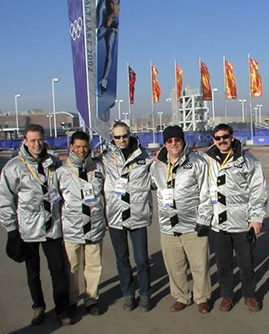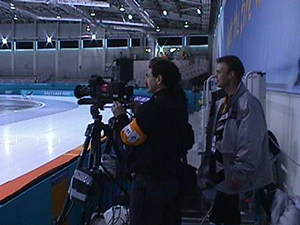Posted 3:34 p.m. Wednesday, March 1, 2017

Speed skating links UWL, Amsterdam university in long-term partnership.
Speed skating links UWL, Amsterdam university in long-term partnership
A decades-long partnership between UW-La Crosse and the Vrije Universiteit-Amsterdam started because of a rare interest in the science of speed skating. The partnership has helped Olympic athletes set new records, but it’s also brought benefits much closer to home. Since the partnership started, about 40 Dutch interns have studied and conducted research in the Department of Exercise and Sport Science at UWL. Additionally, a regular stream of student from the University of Rome Foro Italico join the Dutch students in the UWL Human Performance Laboratory. Meanwhile, UWL faculty and students have led an increasingly popular clinical exercise physiology class in Amsterdam. [caption id="attachment_48097" align="alignleft" width="269"] Carl Foster and John Porcari, pictured far right, at the 2002 Winter Olympics in Salt Lake City. Foster worked with the U.S. Olympic speed skating team until 2006, when training moved to Salt Lake City.[/caption]
The partnership with the Vruje Universiteit-Amsterdam (VU ) started in the late 1970s when Carl Foster, UWL professor of exercise and sports science, started working with American Olympic coaches, then based in Milwaukee, on new techniques and technology for faster times in speed skating. At the same time, Jos De Koning, a professor at VU, was conducting similar research for Olympic athletes in the Netherlands.
“There are not many people on the planet working on the science of speed skating, so we met and started doing projects together,” says Foster.
They took up topics from pacing strategy and starting techniques to speed skating gear that ultimately allowed new records to be made in the sport.
Over the years, Foster and De Koning became two of the world’s leading scientists in speed skating.
When De Koning wanted to broaden curriculum at VU to include a clinical exercise physiology course about eight years ago, he turned to his long-term colleague and friend — Foster.
[caption id="attachment_48098" align="alignright" width="300"]
Carl Foster and John Porcari, pictured far right, at the 2002 Winter Olympics in Salt Lake City. Foster worked with the U.S. Olympic speed skating team until 2006, when training moved to Salt Lake City.[/caption]
The partnership with the Vruje Universiteit-Amsterdam (VU ) started in the late 1970s when Carl Foster, UWL professor of exercise and sports science, started working with American Olympic coaches, then based in Milwaukee, on new techniques and technology for faster times in speed skating. At the same time, Jos De Koning, a professor at VU, was conducting similar research for Olympic athletes in the Netherlands.
“There are not many people on the planet working on the science of speed skating, so we met and started doing projects together,” says Foster.
They took up topics from pacing strategy and starting techniques to speed skating gear that ultimately allowed new records to be made in the sport.
Over the years, Foster and De Koning became two of the world’s leading scientists in speed skating.
When De Koning wanted to broaden curriculum at VU to include a clinical exercise physiology course about eight years ago, he turned to his long-term colleague and friend — Foster.
[caption id="attachment_48098" align="alignright" width="300"] John Porcari helps film speed skating at the 2002 Winter Olympics.[/caption]
Foster has now taught the course for the last seven years during UWL’s winter intersession. Five years ago, John Porcari, program director of UWL’s Clinical Exercise Physiology program, joined him. The course has grown in popularity from 40 to 165 students this past session.
The course, a highly-condensed version of UWL’s graduate CEP program, offers students a look at the different types of exercise training that is proven to have a therapeutic benefit for patients with chronic diseases.
A worldwide impact
In both VU and UWL courses, Foster and Porcari relate the class material to what’s happening in the real world and inject a bit of humor, says UWL Alum Chelsea Hahn, a December 2016 graduate of UWL’s program.
Hahn, now a research and teaching assistant for the UWL Exercise and Sport Science Department, joined Foster and Porcari at VU this winter where she taught two practical sessions. She was impressed with how engaged the students were, raising their hands and making comments. One even left after class, got to the bus stop and walked back to ask a few more burning questions.
“Having experiences like that with students who are really interested in what they are learning is fun for me,” she says. “This experience really solidified my career goals in the field.”
Hahn recently interviewed for a lecturer position at a university in Nebraska. The interviewers saw UWL and immediately asked her about her connection with Porcari and Foster.
The two have earned a reputation — well beyond UWL and VU. Their research has changed the way professional athletes compete and everyday people exercise around the world for decades. They are frequently featured in national news media, providing scientific evidence related to the health benefits of the latest fitness craze. They have both been presidents of major professional societies, Porcari for the American Association of Cardiovascular and Pulmonary Rehabilitation in 2001-2002 and Foster for the American College of Sports Medicine in 2005-2006.
Hahn, who had them both as mentors, calls them “rock stars” in the field, yet down-to-earth in person.
“It opens a lot of doors knowing these two,” she adds.
Many UWL students and international interns have had the opportunity to know Porcari and Foster well. About 15 a year work with them on graduate-level master’s thesis projects. About a dozen go on to present that research at national conventions.
Many of those former students — both here and abroad — are now well into their careers and making their own contributions. Many of the emerging leaders in clinical exercise physiology, both regionally and nationally, have roots in UWL’s Clinical Exercise Physiology graduate program.
“That’s very satisfying,” says Foster.
John Porcari helps film speed skating at the 2002 Winter Olympics.[/caption]
Foster has now taught the course for the last seven years during UWL’s winter intersession. Five years ago, John Porcari, program director of UWL’s Clinical Exercise Physiology program, joined him. The course has grown in popularity from 40 to 165 students this past session.
The course, a highly-condensed version of UWL’s graduate CEP program, offers students a look at the different types of exercise training that is proven to have a therapeutic benefit for patients with chronic diseases.
A worldwide impact
In both VU and UWL courses, Foster and Porcari relate the class material to what’s happening in the real world and inject a bit of humor, says UWL Alum Chelsea Hahn, a December 2016 graduate of UWL’s program.
Hahn, now a research and teaching assistant for the UWL Exercise and Sport Science Department, joined Foster and Porcari at VU this winter where she taught two practical sessions. She was impressed with how engaged the students were, raising their hands and making comments. One even left after class, got to the bus stop and walked back to ask a few more burning questions.
“Having experiences like that with students who are really interested in what they are learning is fun for me,” she says. “This experience really solidified my career goals in the field.”
Hahn recently interviewed for a lecturer position at a university in Nebraska. The interviewers saw UWL and immediately asked her about her connection with Porcari and Foster.
The two have earned a reputation — well beyond UWL and VU. Their research has changed the way professional athletes compete and everyday people exercise around the world for decades. They are frequently featured in national news media, providing scientific evidence related to the health benefits of the latest fitness craze. They have both been presidents of major professional societies, Porcari for the American Association of Cardiovascular and Pulmonary Rehabilitation in 2001-2002 and Foster for the American College of Sports Medicine in 2005-2006.
Hahn, who had them both as mentors, calls them “rock stars” in the field, yet down-to-earth in person.
“It opens a lot of doors knowing these two,” she adds.
Many UWL students and international interns have had the opportunity to know Porcari and Foster well. About 15 a year work with them on graduate-level master’s thesis projects. About a dozen go on to present that research at national conventions.
Many of those former students — both here and abroad — are now well into their careers and making their own contributions. Many of the emerging leaders in clinical exercise physiology, both regionally and nationally, have roots in UWL’s Clinical Exercise Physiology graduate program.
“That’s very satisfying,” says Foster.